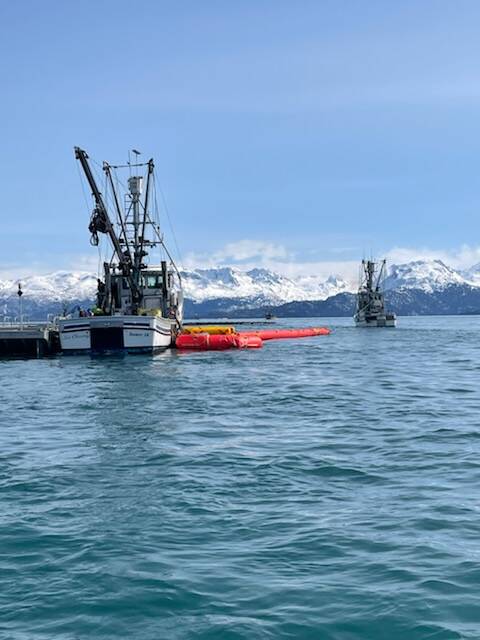Alyeska Pipeline Service Company began in March its annual spring training for oil spill response preparation. Central Gulf communities participating in the training include Kodiak, Homer, Seward, Whittier, Cordova and Valdez. The Homer training took place last week, April 5-8.
On Friday, approximately 20 local fishing boats were on Kachemak Bay for the water equipment component of training. Boats participating in the training practiced with gear onshore before deploying skimmers, booms and other equipment from their vessels.
Ahead of the exercise on the water, mariners had completed online training and practiced in a classroom.
Vessels are typically dispatched from the port around 6 a.m. They pick up equipment from tug/supply vessel Ross Chouest, conduct the drills and demobilize equipment in the early afternoon before returning to harbor. Vessel captains also have a “hot wash” debrief meeting in the evening after training.
On Friday, as boats practiced responding to spills on the bay, Kate Dugan, Valdez communications manager with Alyeska Pipeline, pointed out the tugboat M/V Ross Chouest.
Usually stationed at Port Etches, at the entrance of Prince William Sound, the tugboat is part of the Alyeska Ship Escort Response Vessel System (SERVS).
“If a tanker gets into trouble beyond the entrance to the Sound, the Ross Chouest is available for transit assistance. It’s part of our contingency commitment to the state,” Dugan said.
Another role of the Ross Chouest is to provide mooring maintenance for Prince William Sound hatchery and to support the fishing vessel training program. When the tugboat is on-call for these tasks, another boat takes its place at Hinchinbrook.
The Fishing Vessel Program was started in 1990 after the Exxon Valdez oil spill and contracts with more than 350 vessels, especially those working in the fishing industry, in the six ports each year.
Local vessels are now a critical and integrated response to spill contingency plans. “In order for the vessels to operate in the event of a spill, they need to have their certification completed annually,” Dugan said.
“In addition to towing booms, small vessel operators can also work from shore setting up exclusion boom and providing wildlife response. Wildlife response training only happens in one port each year,” she said.
Those drills are designed to train on hazing and capture of animals. Alyeska works with International Bird Rescue for sea birds and a mobile otter hospital that can be deployed for basic triage, care and cleaning within several days in the event of a spill, she said.
The service vessel equipment used for the trainings are owned by Edison Chouest Offshore (ECO), the company that holds the Ship Escort/ Response Vessel system contract in Alaska. Their sub-contract services to Alyeska Pipeline include operation of escort tugs, general purpose tugs, oil recovery storage barges, and associated personnel for oil spill prevention and response services.
Dugan emphasized the importance of using personal protective equipment, hard hats and safety glasses throughout the training. “It is a critical part of our safety regulations that every one uses the appropriate gear,” she said.
Bringing a component of industrial safety culture to a fleet of vessels that doesn’t always use it can be a good lesson, she said. “We’ve heard from participants that the practice of using some of these devices when the boats are actively fishing instead of this training has actually saved lives. It should be treated as an important lesson.”
Participants are paid by each day that they contribute to work. The vessels are categorized as Tier 1 and Tier 2 vessels. Tier 1 vessels are offered a higher number of drills every year and are offered a winter stipend if they keep their boats in the water in Prince William Sound: Cordova, Whittier or Valdez.
In addition to the fishing vessel trainings, Alyeska also runs training drills for open water barges capable of carrying larger skimmers and booms. The smaller vessel contribution is designed for the near shore and more shallow water response.
Seward training took place April 11 and 12. Whittier training will take place April 15 and 17. Final trainings in Cordova and Valdez will be complete by May 3.


